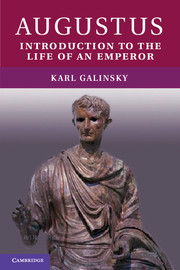Book contents
- Frontmatter
- Contents
- List of Maps, Genealogical Chart, and Illustrations
- Maps & Genealogical Chart
- Timeline
- Note on Major Ancient Sources
- Preface
- 1 From Velitrae To Caesar’s Heir
- 2 Power Struggles and Civil War
- 3 The Experiment of the Principate
- 4 The Challenge of Pax Augusta
- 5 Augustus at Home
- 6 Cultural Vitality
- 7 The Augustan Empire
- 8 The Final Days and an Assessment
- Select Bibliography and References for Further Reading
- Index
- Index of Passages and Inscriptions
1 - From Velitrae To Caesar’s Heir
Published online by Cambridge University Press: 05 February 2013
- Frontmatter
- Contents
- List of Maps, Genealogical Chart, and Illustrations
- Maps & Genealogical Chart
- Timeline
- Note on Major Ancient Sources
- Preface
- 1 From Velitrae To Caesar’s Heir
- 2 Power Struggles and Civil War
- 3 The Experiment of the Principate
- 4 The Challenge of Pax Augusta
- 5 Augustus at Home
- 6 Cultural Vitality
- 7 The Augustan Empire
- 8 The Final Days and an Assessment
- Select Bibliography and References for Further Reading
- Index
- Index of Passages and Inscriptions
Summary
Childhood and adolescence, synonymous in our times with “formative years,” did not arouse nearly the same interest in Roman biographers as in their modern counterparts. Concern with developmental psychology was slim at best; just as most characters in ancient literature are presented as fully formed while their different facets are being illuminated, so Roman art generally depicts children as little adults. Reliable information about Augustus’ early life, therefore, is scant and centers on some basic data, such as his birth, and on noteworthy events like the funeral oration he gave in Rome, at an early age, in honor of his grandmother Julia. In addition, and as could be expected in light of his later prominence, there is a goodly number of accretions, most dealing with miracles and portents – there was a public for those – that were clearly later inventions.
Augustus Gets a “Life”
As always, there is the proverbial exception. That in this case is the biography by Augustus’ contemporary, Nicolaus of Damascus, written perhaps around 20 BC. Nicolaus, a highly educated Greek, was not only an extremely versatile author but also a close adviser to Herod the Great and involved in several diplomatic missions, and it is likely that he met Augustus on one of these. The full title of his work is significant: On the Life of Caesar Augustus and His Agōgē; agōgē connotes upbringing, education, and direction. Given the stature and impact of Augustus, we might expect such a work to be a bestseller, but such was not the case. In fact, it is not cited by any ancient author and owes its survival, which is only partial, to a Byzantine ruler of the tenth century AD. He had it excerpted and then excerpted again: the various passages, sometimes shortened, were assigned to fifty-three subject categories, such as “Virtue and Vice” and “Conspiracies against Kings.” The Life, such as we have it in its reassembled state, breaks off amidst the events a few months after Julius Caesar’s death. Even so, the main significance of Nicolaus’ work is that it was based, to a great extent, on the autobiography that Augustus, always the innovator, wrote not late in his life, but in his mid-thirties. Entitled De vita sua, it is another work from antiquity that has not survived. Suetonius, for one, used it but does not cite from it directly anywhere in his Life of Augustus.
- Type
- Chapter
- Information
- AugustusIntroduction to the Life of an Emperor, pp. 1 - 19Publisher: Cambridge University PressPrint publication year: 2012



